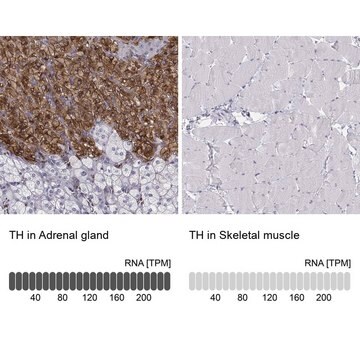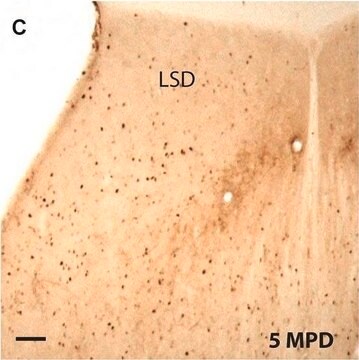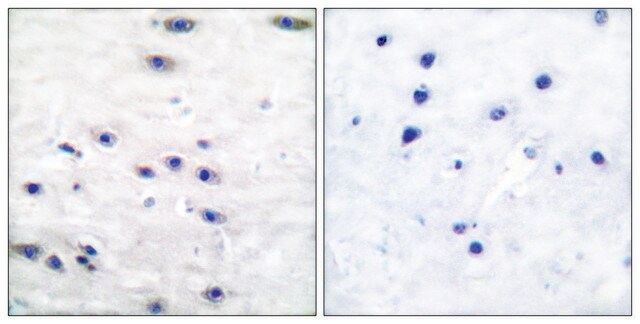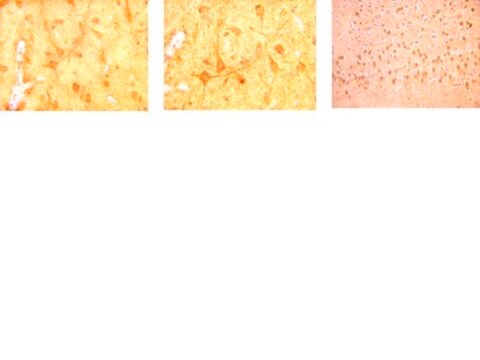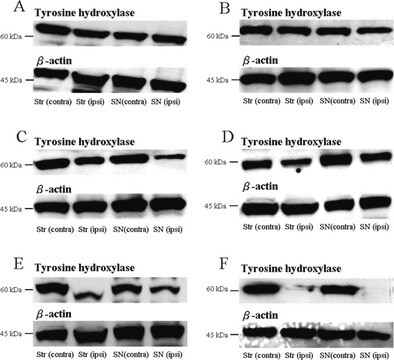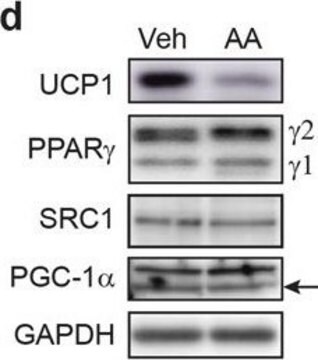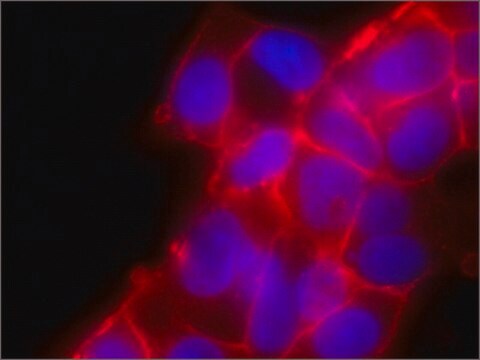推荐产品
生物源
rabbit
共軛
unconjugated
抗體表格
affinity isolated antibody
抗體產品種類
primary antibodies
無性繁殖
polyclonal
形狀
buffered aqueous solution
分子量
antigen 58 kDa
物種活性
human, mouse, rat
濃度
~1 mg/mL
技術
ELISA: 1:40000
immunohistochemistry: 1:50-1:100
western blot: 1:500-1:1000
NCBI登錄號
UniProt登錄號
運輸包裝
wet ice
儲存溫度
−20°C
目標翻譯後修改
phosphorylation (pSer40)
基因資訊
human ... TH(7054)
一般說明
Tyrosine Hydroxylase (TH) is encoded by the gene mapped to human chromosome 11p15.5, close to the insulin (INS) and Harvey-ras-1 (HRAS) genes. The N-terminal end of the protein plays a vital role in maintaining intracellular stability of the enzyme. tyrosine hydroxylase is expressed in various tissues such as brain, adrenal medulla and sympathetically innervated tissues. The enzyme is characterized with a regulatory domain (R), a catalytic domain (C) at N-terminal end, and a coiled-coil domain at the C-terminal end.
免疫原
The antiserum was produced against synthesized peptide derived from human Tyrosine Hydroxylase around the phosphorylation site of Ser40.
Immunogen Range: 41-90
Immunogen Range: 41-90
生化/生理作用
Tyrosine Hydroxylase (TH) specifically catalyzes the hydroxylation of the amino acid L-tyrosine to 3, 4-dihydroxy-L-phenylalanine (L-DOPA). TH is a rate-limiting enzyme involved in the synthesis of catecholamine, involved in several brain functions, such as attention, memory, cognition, and emotion. Phosphorylation of the N-terminal portion of tyrosine hydroxylase controls the degradation of this enzyme by the ubiquitin-proteasome pathway. Alteration in the expression of the gene results in the pathogenesis of Parkinson′s disease (PD). Point mutation in the gene coding for TH leads to Segawa′s syndrome.
特點和優勢
Evaluate our antibodies with complete peace of mind. If the antibody does not perform in your application, we will issue a full credit or replacement antibody. Learn more.
外觀
Rabbit IgG in phosphate buffered saline (without Mg2+ and Ca2+), pH 7.4, 150mM NaCl, 0.02% sodium azide and 50% glycerol.
免責聲明
Unless otherwise stated in our catalog or other company documentation accompanying the product(s), our products are intended for research use only and are not to be used for any other purpose, which includes but is not limited to, unauthorized commercial uses, in vitro diagnostic uses, ex vivo or in vivo therapeutic uses or any type of consumption or application to humans or animals.
未找到合适的产品?
试试我们的产品选型工具.
儲存類別代碼
10 - Combustible liquids
水污染物質分類(WGK)
WGK 1
閃點(°F)
Not applicable
閃點(°C)
Not applicable
K L O'Malley et al.
Nucleic acids research, 16(10), 4437-4446 (1988-05-25)
The gene for the catecholamine biosynthetic enzyme, tyrosine hydroxylase (TH), has been previously mapped to human chromosome 11 p15.5 in the vicinity of the loci for insulin (INS) and for the oncogene Harvey Ras 1 (HRAS). Here we show that
S Colette Daubner et al.
Archives of biochemistry and biophysics, 508(1), 1-12 (2010-12-24)
Tyrosine hydroxylase is the rate-limiting enzyme of catecholamine biosynthesis; it uses tetrahydrobiopterin and molecular oxygen to convert tyrosine to DOPA. Its amino terminal 150 amino acids comprise a domain whose structure is involved in regulating the enzyme's activity. Modes of
Christopher Tolleson et al.
CNS & neurological disorders drug targets, 11(4), 381-386 (2012-04-10)
Tyrosine hydroxylase (TH) is the rate limiting step in the biosynthesis of dopamine and other catecholamines. Differences have been noted in concentration and availability of this enzyme and its cofactors in disease states such as Parkinson's disease (PD) which are
Akira Nakashima et al.
Biochemical and biophysical research communications, 407(2), 343-347 (2011-03-12)
Tyrosine hydroxylase (TH) is the rate-limiting enzyme in catecholamine biosynthesis, and its N-terminus plays a critical role in the intracellular stability of the enzyme. In the present study, we investigated the mechanism by which the N-terminal region of TH affects
B Lüdecke et al.
Human genetics, 95(1), 123-125 (1995-01-01)
We have examined the molecular basis of Segawa's syndrome in six families with seven affected children. In one family two siblings with this disease carried a point mutation in exon 11 of the tyrosine hydroxylase gene, resulting in an amino
我们的科学家团队拥有各种研究领域经验,包括生命科学、材料科学、化学合成、色谱、分析及许多其他领域.
联系客户支持

